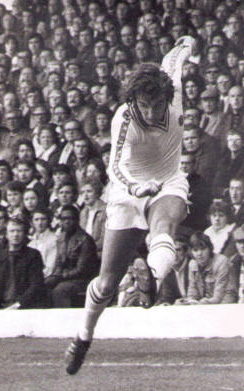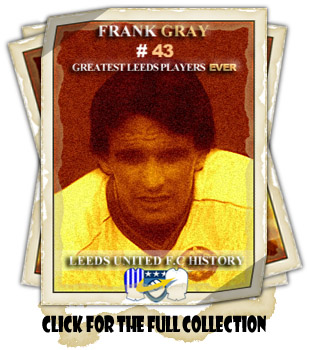

Gray: Francis Tierney (Frank)
1971-1979&1981-1985
(Player Details)
Midfield/Left Back
Born: Castlemilk, Glasgow: 27-10-1954
Debut v Leicester City (a) (substitute): 10-02-1973
5’9 1/2” 11st 10lb (1973)
#43 in 100 Greatest LUFC Players Ever

Although not as gifted as elder brother Eddie, he won thirty-two caps for Scotland in a
career which saw him avoid major injury. His career in his early days followed those of his
older brother, Glasgow Schools representative and Schoolboy International. He was a former
Parkhead ball-boy and Celtic fanatic, but he went to Leeds in the summer of 1970, after
United signed him in the face of opposition from about thirty other clubs. He turned
professional in November 1971 and, after two games as a substitute, one in the League at
Leicester City on 10th February 1973, and the second in an away European Cup-winners' Cup
tie with Rapid Bucharest on 21st March 1973, scored on his full debut on 21st April 1973
against Crystal Palace at Elland Road, to emulate another feat of his elder brother. Frank
Gray was one of the new generation of Leeds United players of the mid-1970s charged with
the task of maintaining the club's success after the Don Revie era. Revie had lost regular
left back Terry Cooper to an horrific broken leg the year before and needed to find a
replacement. Therefore the young Gray was given his chance at left-back as a result. He
didn't stay long in the side, as a reshuffled defence allowed Trevor Cherry to take the
left back spot for the business end of the season which consisted of two Cup finals, the
FA Cup and the European Cup-winners Cup, both of which Leeds lost. Revie did, however,
invite Gray to travel with the squad to Wembley and he sat next to his manager during the
defeat by Sunderland. Gray was similarly spared regular football in the first team at such
an early age during the following year, with Cherry settled into the left back role. Leeds
won the League Championship thanks to mainly to a twenty-nine games unbeaten start to the
season. Gray only played three times and didn't qualify for a medal. He got his chance the
following season though, making eighteen appearances in the League and usurping Cherry for
the No.3 shirt in the European Cup final in Paris, which Leeds lost 2-0 to Bayern Munich.
As the Revie team disbanded due to age, Revie himself had quit for the England manager's
job the year before, Gray found himself tagged as one of the bright young stars who would
try to maintain the standard of the previous team, alongside the likes of Gordon McQueen
and Joe Jordan. It never quite worked like that, with Leeds sliding into comparative
mediocrity for the rest of the 1970s. He was such a naturally gifted player that things
came easy to him. He had speed, was a superb passer of the ball and read the game with
intelligence, took penalties with ease and played a simple but stylish game. He had all
those great natural gifts but did not have the passion of a Bremner, Collins or Hunter,
if he had he would have been world-class. Like Eddie, he also played on the left but in a
deeper midfield role, and won five Scotland Under-Twenty-Three caps. He won them from 13th
March 1974, when he made his debut at St James' Park, Newcastle, until 24th March 1975 at
Easter Road, Edinburgh against Holland, when still just turning twenty-one. Later he
switched to left back and often played in the same team as his elder brother, providing
United with a very solid left side. He made his full Scotland debut on 7th April 1976 in
Scotland's 1-0 win over Switzerland at Hampden Park and had made six starts and one
substitute appearance when Leeds received a then club record £500,000 when he moved to
Nottingham Forest in July 1979, whose manager Brian Clough, had been clearly impressed
with what he'd seen of the defender during his infamous forty-four-day spell in charge at
Leeds four years earlier. Gray slotted into the team and played in his second European Cup
final in 1980, making him the first player to appear in the final for two different
English clubs. This time he was successful as Forest won 1-0 against a useful Hamburg SV
side which included Kevin Keegan. Gray also finished on the losing side earlier in the
season when Forest were beaten in the League Cup final by Wolves, thanks to a single goal
from unrelated fellow Scotsman Andy Gray. Under Brian Clough, Gray enjoyed his best years,
scoring five times in eighty-one games, climaxing in a European Cup Winners’ Medal in 1980
to go with the Losers’ Medal he had got with Leeds in 1975. Despite his success, Gray never
fully settled at Forest and accepted an invitation in May 1981 to return to Leeds by former
team-mate Allan Clarke, who was now manager, Gray had been Scotland’s left back in the 1982
World Cup in Spain and had added another six starts and one substitute appearance to his
growing tally of caps which now numbered fourteen. It was a cut-price £300,000 deal which
got Gray back into Elland Road, but in the first season after his return Leeds were
relegated. Clarke was fired from Leeds after the drop and Gray's brother Eddie took over.
The younger Gray played for four years under his brother's stewardship but Leeds couldn't
gain promotion and regain their First Division status. He also featured regularly for
Scotland, and scored his first and only goal for his country on 23rd March 1982 with a
thirteenth minute penalty against Holland at Hampden, but played his final game for them in
Edmonton Canada on 16th June 1983, when the hosts were beaten 3-0 and by then Gray had made
thirty starts and two games as a substitute. He left for Sunderland in 1985, for £100,000,
helping them gain promotion from Division Three in 1987-88. After ten goals in one hundred
and fifty-nine games, he was freed by Sunderland in April 1989 and was appointed
Player-Assistant Manager at Darlington, helping to steer them back to the Fourth Division
as Champions of the GM Vauxhall Conference in 1990. He took over as Manager when Brian
Little departed, but he too left the Feethams after just one year. He remained at the
Feethams until February 1992, scoring seven goals in forty-nine League games and a total of
eight goals in eighty-five in all games. He then scouted for Blackburn Rovers and Sheffield
Wednesday, before taking over as Manager of Harrogate Town in December 1993, resigning the
following June to take charge of Al Mananmah in Bahrain. He later became an Academy Coach
with Southampton and an agent. He became Manager of Farnborough Town on 5th May 2005 and
took them to the Nationwide Conference South play-offs in 2005–06 before joining Grays
Athletic a year later on 26th May 2006. He left them in October 2006 and the joined Woking
in May 2007 on a two year contract, but left by mutual consent on 8th April 2008. He then
joined Conference South Club Basingstoke Town in May 2008, where is he is still their
Manager. Apart from being the younger brother of Eddie Gray he is also the father of Andy
Gray.